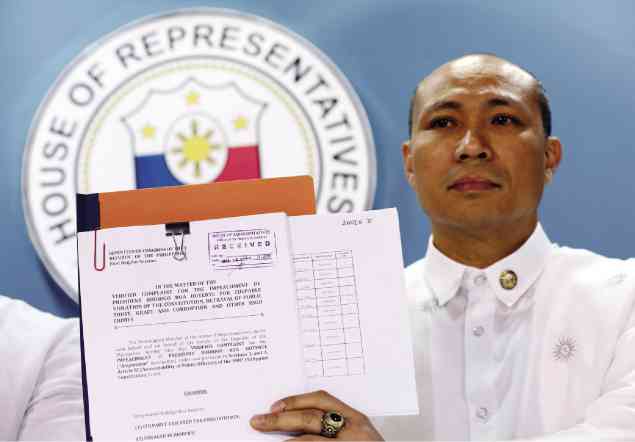Impeachment stupidities
It seems we are headed for the second stage of the impeachment wars without apparently having learned the right lessons from the first. Last Thursday, Magdalo Rep. Gary Alejano filed the first impeachment complaint against President Duterte, just as Congress was about to go on recess.
An angry Speaker Pantaleon Alvarez retaliated with a direct threat to impeach Vice President Leni Robredo, based he said on his understanding that her video message to a United Nations forum constituted a “betrayal of public trust.” The threat was immediately followed by a ridiculous complaint filed by serial impeachment filer Oliver Lozano. Another complaint against Robredo is set to be filed in the House of Representatives tomorrow, as announced by a lawyer who was suspended by the Supreme Court for ethical misconduct.
Alejano himself is not exactly beyond reproach; he was imprisoned for staging a (failed) mutiny and later pardoned. But he alleges that the President is liable both for the killings perpetrated in the administration’s so-called war on drugs and by the Davao Death Squad and for massive corruption. Lozano and another devoted Marcos loyalist, Melchor Chavez, allege that Robredo’s video message criticizing the administration’s war on drugs amounted to an impeachable offense, and that she was a “termite of the government.” Alvarez lambasted the Alejano complaint as “stupidity,” and added: “We are all entitled to our own stupidity.”
But in truth Alvarez’s description is a better fit for the Lozano-Chavez complaint; when has criticism, even by the highest officials of the land, become tantamount to betrayal of public trust? When President Duterte announced to the world his
unverified claim that as much as 40 percent of the Philippine National Police—the same agency he burdened with the task of waging his deadly war on drugs—was corrupt, did that criticism, heard around the world, betray the public trust?
We should be able to consign the Lozano-Chavez complaint to where it belongs, the dustbin of impeachment filings. (Lozano, who rose to notoriety after Ferdinand Marcos fled the Philippines in 1986, filed five impeachment complaints against President Gloria Arroyo and two against President Benigno Aquino III.) But because the core assertion of their petition echoes Alvarez’s statement, and Alvarez clearly believes that impeachment is nothing but a numbers game, we cannot so easily laugh off the Lozano-Chavez complaint.
Alvarez has learned the wrong lesson from the first stage of the impeachment wars.
The wars began in 2000, when Speaker Manny Villar allowed one-third of the House membership to impeach President Joseph Estrada. The impeachment trial in the Senate convened, but a tactical mistake on the part of Estrada’s defenders led to mass protests; Estrada eventually abandoned the presidential palace. The wars continued in 2003, with the failed bid, again by one-third of the House membership, to unseat Chief Justice Hilario Davide. Ombudsman Merceditas Gutierrez was impeached by the House in 2011, but she resigned her office before the trial in the Senate commenced. Chief Justice Renato Corona was impeached in 2011 and convicted, by the Senate convened as an impeachment court, in 2012.
From this history, Alvarez has learned that impeachment is a numbers game; in other words, it is merely political. Senate President Aquilino Pimentel III’s inane, insensitive remark, that the impeachment bid against Mr. Duterte had awakened the “sleeping giant” in Alvarez, could not have been uttered by his father when Aquilino Pimentel Jr. was Senate president in 2000—for one thing, the elder Pimentel had a base of support of his own and did not need to cozy up to power brokers; for another, he had a higher understanding of impeachment, precisely as the “terrible swift sword” that should not be wantonly unsheathed. Only a numbers game? Talk about stupidity.





















